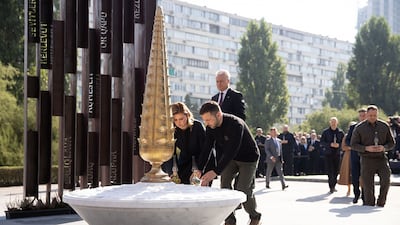It’s only early autumn, but here in Ukraine, the worry is the upcoming winter. Ukrainian winters are long and harsh. The estimation from the government is that this one will be significantly worse than the last. Electricity cuts, a lack of heating and difficulty getting water means everyone is scurrying to prepare with generators, solar panels or Ecoflows – power banks for refrigerators or internet routers. Nearly three years of war have taken a toll.
Kyiv last week was something akin to New York City during the UN General Assembly. There were half a dozen high-level conferences, beginning with the Ukrainian President’s wife Olena Zelenska’s meeting of global presidential spouses, which focused on protecting children in war time. The Prosecutor General, Andriy Kostin, hosted the International Criminal Court’s Chief Prosecutor Kareem Khan for a conference centred on Russian attacks on Ukrainian infrastructure. The Tony Blair Institute hosted a conference on demining. Even Michael Douglas, the Oscar-winning actor, came to town.
The week ended with Ukrainian businessman Viktor Pinchuk’s annual gathering of former presidents and prime ministers, diplomats and public intellectuals for the Yalta European Strategy (YES). The main takeaway was that Ukraine must win the war.
Overshadowing everything at the conference was the ghost of former US president Donald Trump. The question of how to win the war – which is branded in Ukraine and much of the continent as not just as a Ukrainian war, but a European war – depends on how much more military support the Ukrainians receive. Can they defend themselves by getting more Patriot batteries and anti-missile systems to intercept Russian ballistic missiles? Can the Ukrainians be given longer-range anti-missile systems to intercept incoming Russian missiles?
The answers depend, in many ways, on the November US presidential election.
Few sitting around the table at YES seemed to think Mr Trump sees Ukraine as a friend. (A day after the forum ended, a pro-Ukraine activist in the US was charged after an apparent attempt to assassinate Mr Trump.) But former secretary of state Mike Pompeo, who attended the conference, had a different view. He believes even Mr Trump – if he wins the election – will continue to support Ukraine.
“You can’t get it right for American security without a Ukrainian victory and a strong Europe,” Mr Pompeo said, referring back to his 2018 Crimea Declaration, in which the US rejected Russian attempts to annex Crimea from Ukraine.
I think it more likely that if he is elected Mr Trump will pull support from Ukraine in whatever way he can. I recall Mr Pompeo’s predecessor, Hillary Clinton, at last February’s Munich Security Forum remarking that Mr Trump always does what he says he will do – and he’s repeated his wish to stop issuing “blank cheques” to Ukraine.
Everyone at YES agreed a Ukrainian victory is necessary, not just for its own sovereignty but for the future of Europe. Mr Pinchuk opened the conference saying European cities risk being overrun by Russian forces the same way they overran the Ukrainian city of Bucha in February 2022.
It might be a scare tactic, but in a continent still traumatised from the ease with which Hitler marched into Czechoslovakia and Poland in 1939 – and the Foreign Minister of Poland was present at YES – there is a fear that borders can always be erased. Especially vulnerable are the Baltics and Eastern Europe, including Moldova where the region of Transnistria has been in a frozen conflict for 30 years.
It is difficult to win a war by being only defensive, and Ukraine has made important tactical gains, like its Kursk offensive, in which it took about 1,300 square kilometres inside Russia.
The greatest concern is how to support Ukraine on the battlefield. After nearly three years of hard fighting, in front lines that resemble the First World War trenches, soldiers are exhausted. “Victory can be gained by three means – people, weapons and will,” one YES guest said.
Ukraine does have a strong desire to win, although the losses on the front line were highlighted at YES in the form of a collage of faces of the dead heroes. What struck me was how young they were, and what a terrible loss this represents to their society.
We know Russia is intent on winning this war. But Ukraine has an extraordinary will, and a population who are fighting for their freedom, as well as, they believe, European freedom. The challenge is to convert these powerful motivations – with the help of its allies in Europe, the US and elsewhere – into what the Ukrainians call “peremoha” – victory.


